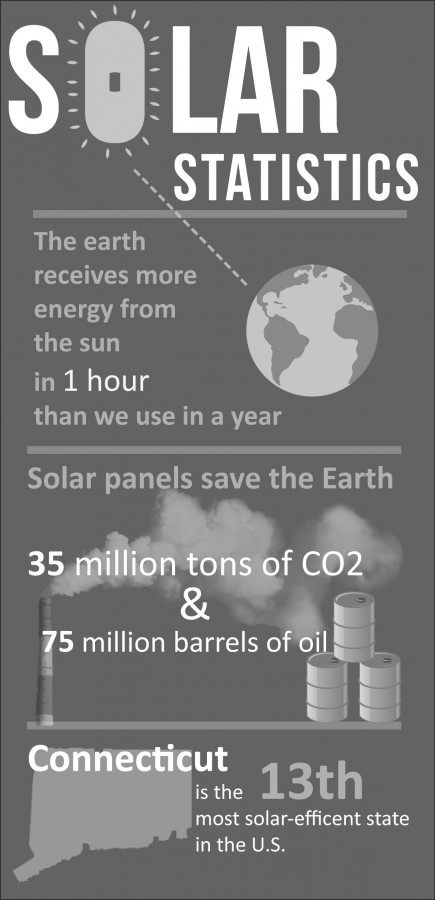Westport warms to possibility of solar panels
Imagine a form of energy that is completely clean, renewable and inexpensive in the long run. It has none of the filth of fossil fuels. Using it on a large-scale basis would allow many people to enjoy the typical benefits of electricity, while at the same time live without the guilt of burning dirty, finite fuel.
Solar panel systems, can create this clean energy, and Board of Education [BOE] is considering installing them on the roofs of at least some of the Westport Public Schools. Because of government subsides, installing the panels immediately would cost little to nothing.
“We would be producing less carbon emission and would be saving more money in the long run,” Robby Gershowitz ’14, Club Green co-president and member of Green Task Force said.
But the solution raises questions, mainly about the indirect costs potentially incurred with installation.
Elaine Whitney, BOE Chair, said the Board worries that since most Westport school roofs are older, they will need to be replaced relatively soon. This would mean removing the solar panels. Leakage is another fear, she said.
“The ideal scenario would be putting in new roofs at the same time as the solar panels,” Whitney said. “Our goal is to ensure the integrity of our roofs.”
What makes the entire decision so difficult is the exceptionally low cost for installation of the panels.
Michael Aitkenhead, an AP environmental science teacher explained that if Westport schools were to proceed with solar panels, a power company would pay for all the necessary costs of implementation and management. This purchase power agreement would essentially turn the schools’ roofs into power plants, which is why schools would not be charged anything.
Aitkenhead said that if the schools want to go ahead with this project, the best time to do so is immediately.
“Right now the government subsidizes solar energy in Connecticut,” Aitkenhead explained. “But these funds are highly limited. Once these funds run out, businesses won’t have the frame to do these large-scale installations in that it would still be profitable to them.”
Much of the benefit of solar panels stems from environmental sustainability.
Photovoltaic cells emit no pollutants and on a long-term scale can save people tens of thousands of dollars in lifetime energy costs. Some people feel that installation of a solar system on many of the Westport schools is worth the potential repair costs.
The main advocate for this new type of energy is the Green Task Force, which, since its 2006 inception, has aimed to bring renewable resource use up to 20 percent of local energy consumption. At the April 7 BOE meeting, the task force made a proposal to develop complete solar electricity on the roofs of at least some of the Westport Public Schools. The immediate hope is to bring photovoltaic cells to Saugatuck Elementary School, which is in the best position in regards to efficiency and finances.
This idea is far from new. According to Aitkenhead, the initial thought for large-scale utilization of photovoltaic cells dates back five to six years.
“The idea has been floating around for some time,” Aitkenhead said.
Note: at press time, Inklings learned that the school district approved installation of panels.

Being a self-described political junkie and a teen travel writer, Justine Seligson '15 is not only, without a doubt, a well rounded student and basically...

















































